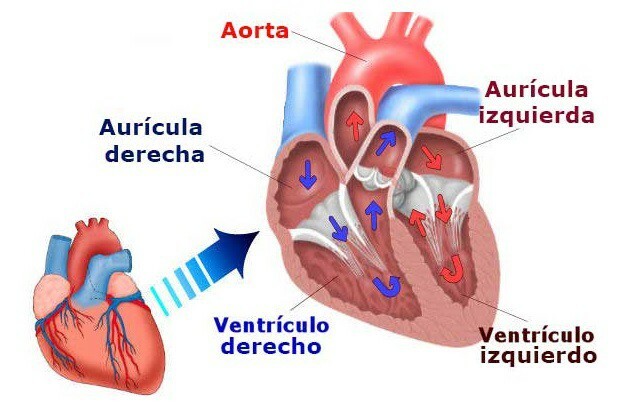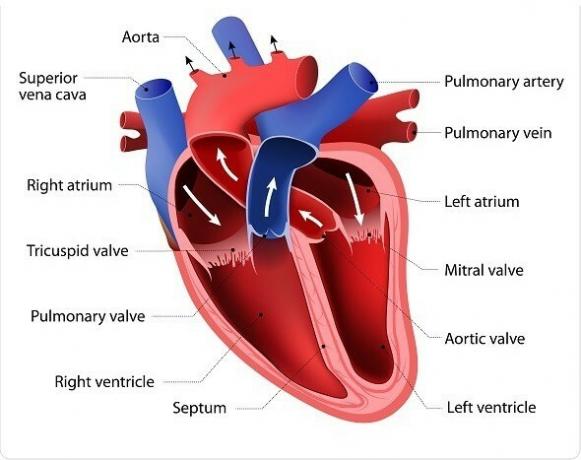The 13 parts of the human heart (and their functions)
One of the earliest developing organs and together with the brain one of the most important for our survival is the heart.
This organ, the main core of the cardiovascular system, allows blood to travel and irrigate the different organs of our body. But the heart is not a uniform mass, it is made up of different elements. In this article we are going to talk about the different parts of the heart.
The heart as the core of the cardiovascular system
The heart is the main organ of the cardiovascular system. It is an organ made up of hollow muscle tissue whose contractions and dilations cause blood to be pumped to the rest of the body. Its contraction or systole is the movement by which the blood is allowed to leave and be propelled towards the arteries, while diastole or dilation allows blood from the arteries to enter it. veins.
The pumping of blood causes the nutrients and oxygen obtained from other bodily functions such as respiration and digestion to reach the different organs of our body, as well as to get rid of the residues of its functioning (as occurs with carbon dioxide, which travels to the heart to later go to the lungs and be excreted with the breathing).
Although its operation may seem simple, the truth is that its beat involves the coordination of the movement of the heart muscle and the correct functioning of its different parts. Its importance is such that the cessation of its functions causes our death (unless artificial mechanisms are used that perform the same function).
Although the heart is connected to and influenced by the nervous system, it actually acts largely autonomously.
Parts of the heart and their functions
The human heart is made up of different parts whose coordinated action allows blood to pump. It is widely known that we can find four chambers inside the heart: two atria and two ventricles.
But it must also be taken into account that there are other elements such as valves that communicate between them and allow both the blood to pass and not to go back or the partitions that separate. In general we can find the following parts of the heart.
1. Left atrium
One of the four main chambers of the heart into which blood is received and pumped. The left atrium is characterized by being connected to the pulmonary veins, from which it receives highly oxygenated blood to later send it to the left ventricle.

2. Mitral valve
One of the parts of the heart, separates and communicates the left atrium from the left ventricle. Its opening (generated by the systole of the atrium) causes blood to travel between both regions.
3. Left ventricle
Another major part of the heart. The left ventricle receives oxygen-rich blood from the left atrium and sends it to the rest of the body through the aorta artery.
4. Aortic sigmoid valve
This valve separates the aorta from the left ventricle and before its opening allows blood with oxygen to reach the rest of the body through the artery. It opens upon contraction or systole and closes upon dilation / relaxation or diastole.
5. Right atrium
The right atrium receives blood from the vena cava, already deoxygenated blood, to send it to the right ventricle.
6. Tricuspid valve
Located between atrium and right ventricle, the tricuspid valve separates both cavities and allows blood to pass between them through its opening. It also prevents blood from going back once closed (which occurs when the ventricle contracts).
7. Right ventricle
This part of the heart receives blood from the right atrium to later send it to the lungs through the pulmonary arteries. There the blood is reoxygenated to later return to the heart through the pulmonary veins.

8. Pulmonary sigmoid valve
It is a valve that separates the right ventricle from the pulmonary arteries. Contraction of the ventricle causes it to open, allowing blood to pass into the respiratory system.
9. Interatrial septum
It is the muscular wall that separate both atria.
10. Interventricular septum
Muscle wall that separates the left ventricle from the right.
11. The sinus or sinoatrial node
This element located in the upper part of the right atrium may not be especially known, but it is one of the most important parts of the heart since they allow its functioning.
And is that this nodule is the structure that allows the heart to beat to generate electrical impulses that cause it to contract (Similar to neurons, the heart beats because this element generates action potentials based on the chemical balance between sodium and potassium). Its functioning is regulated by the autonomic nervous system, although it can function on its own.
12. Atrioventricular or Aschoff-Tawara node
This nodule is another part of the heart whose function allows the heart to beat. It conducts and helps coordinate the electrical impulse initiated in the sinus node. It allows the ventricles not to contract before the blood in the atria passes into them.
13. His fascicles and Purkinje fibers
It is about the elements through which the electrical impulse initiated in the previous modules travels through the entire heart, for example allowing the discharge to reach the ventricles.
Arteries and veins
Although they are not properly part of the heart, the following veins and arteries are those that maintain direct contact with it.
1. Pulmonary veins
These are the veins that carry blood from the lungs to the heart, being their content rich in oxygen (it is the only type of vein whose content is abundant in oxygen).
2. Aorta artery
This artery carries oxygen-rich blood to the rest of the body.
3. Vein cavas
The vena cavae are the blood vessels that reintroduce the deoxygenated blood that has been traveling throughout the body in the heart.
4. Pulmonary arteries
These are the blood vessels that carry oxygen-depleted blood to the lungs to be oxygenated. It is the only type of artery that carries blood without nutrients or oxygen.
